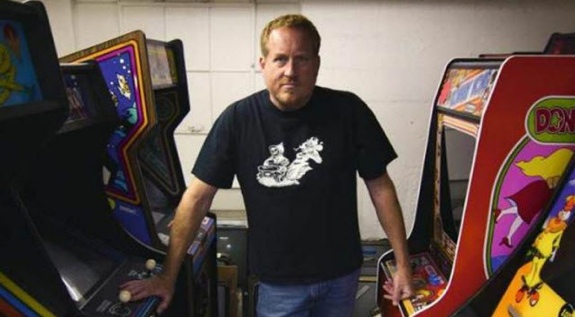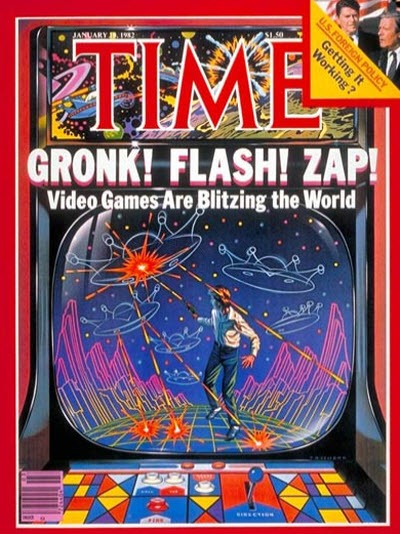Xbox co-creator Seamus Blackley has had quite a career in the gaming industry, having to work in fields of programming, game design and even hardware building and business management. He’s going back to his roots, and to the roots of the industry, with his latest endeavor of Innovative Leisure. He kindly talked to us about his ambitions for Innovative Leisure and also discussed other state of the industry issues.
Give me an overview of what Innovative Leisure is.
Seamus Blackley: It’s a company that makes video games. [pauses]
 Seamus Blackley
Seamus Blackley
Well that’s the most literal response.
Seamus Blackley: I could make you work for it! I’ll be nice though… My wife used to be a production manager for Wired and wrote a book called Supercade about the golden age of arcades, and we are both gaga about games and play them all the time, unlike an increasing number of people in the games industry. We have a deep reverance for classics of the industry, that I compare to the classics of literature. In the course of this, we got invited to a golf tournament called Gonzo, run by and participated in by many veterans of Atari.
It was a thrill being confronted with this group of people hired into Atari when game designer was not a job title or even a concept. By creating that job, they created that craft, they created the greatest string of hits this industry has seen and created the model upon which every other game has based itself on. They had to evolve it and they spawned from the counterculture of computers during the ’70s when being a computer person was a bizarre thing. They created this culture of honesty about design and you hear them talk about the creation of Centipede and Asteroids and it was really adversarial. People take these classics for granted now, but they were honed to be as good as they are.
It’s clear these things work and it involved beating the crap out of each other until it was fun. It seems like you have to see it to believe it, but when a designer from the younger generation plays the original Asteroids, their number one comment is, ‘that’s a great game.’ And it’s been ported to so many devices it’s become a joke, but it earned millions of dollars in the early ’80s because it was good.
Anyway, we go to the tournament and they find out that they play games and they want to be back together. These people worked at NASA, on Madden and in networks for huge companies; back then you really had to know the way code worked so the bar to entry was much higher. It’s easier to write it off to nostalgia, but they were creating everything out of nothing. So it was obvious that someone needed to get these people together.
Flash forward to iOS and the success with that, and there’s the new arcade and people that aren’t necessarily gamers want to play on it. And it’s an equivalent of walking by a game in the ’80s, back when your mom and your aunt might be putting in a quarter, and they’re doing the same thing with games. So it didn’t take a genius to recognize the moment to bring these two generations together.
As you’re probably aware, the games industry had a huge crash in 1983 — the market was flooded with crap, and there was the rise of the PC as a game player. These guys had a lot of good ideas, but they couldn’t stay together. They’ve been honing ideas and they have this amazing trove of ideas, not thinking like game designers do nowadays. We know the rules; I helped create 3D engines and physics engines for games and now it’s ubiquitous so I’ve seen it happen a little bit, but there’s a pioneering approach when you’ve created something from nothing. Mash-ups of game designs as novelty are often confused for innovation but these guys trade in whole new ideas, offering up novel gameplay concepts. We’re going to operate the way it did on the ’70s and it’s the most fun environment to work in ever. They just want to make awesome games. I just hope in 20 years, my brain is still as switched on as them.
Nice to see they’ve kept their passion.
Seamus Blackley: When the Time magazine guys were here, and my son played a PSN game and they crowded around. They were pointing out this one animation as not fitting the game mold, noted this one object didn’t look right and they said the artist probably didn’t put it in the right resolution and they’re picking it apart. The guys from Time said they’ve never seen men of this age group behave like 20 year-olds.
Some of these guys started programing on tubes and they know the technology in a way that most people don’t. The first guy who bought automobiles had to be their own mechanics and it was like that. Some of the younger programmers are used to having a debugger and these guys can operate all that stuff, but they can get down into the assembly and they know the machine, kind of like when F1 drivers had to be their own managers and mechanics; now they’re airlifted into the tracks, but tinkering inside the car gives you extra insight. There are things that don’t occur to younger programmers that can have huge performance benefits and it informs design mentalities. And there are ways to use modern tools that are very meta. We’ve got some interns here helping out with some of the programming and some of the younger programmers are scared to death of these guys.

Many who program now don’t have a clear idea of what the code means anymore. Tim Sweeney at Epic is a genius, a hardware whisperer and back in the day doing that was a minimum bar of entry, but now there are other tools that help people along. Going that in depth, you get a connection to a game you wouldn’t have with thousands of designers.
Seems like during this, the most distruptive point in time in industry history . . .
Seamus Blackley: I remember the birth of 3D PC games and the rise of the NES and PC and PlayStation. There was a point where a recruiter said to me “Anyone without skills to work on PlayStation isn’t going to have a job.” There have been lots of twists and turns, and what it teaches us is the industry itself is undefeatable, and there was the late ’90s when all the marketers left for the Internet and they came back for things like MMOs when that market was peaking.
The key takeaways are that great games continue to be great and that we work in the greatest industry out there. The business models that work are the ones that let people play the game they want. How to play Half Life 2 Get Steam. Want to play Halo Get an Xbox. Want to play Angry Birds Get an iPhone. We now see that great devices get great games. Rather than people being put down by this, it’s extremely exciting.
Tell me, is it more difficult to make a pitch for games than any other medium? Do more business people just not understand games compared to movies and TV?
Seamus Blackley: That’s hard to say really — whenever something gets successful, there’s ultimately people who come on that want to be involved in it that aren’t familiar with the craft. It’s scary to take a bet on content, though, especially if you are a finance person who is not a gamer, and even as a pure game designer, you might like a game but it’s hard to bet a lot of money on whether it will be successful. And then there’s a thing – the scariest thing in the world is an executive that doesn’t play games.
Do you think there’s just a lack of discipline in the industry?
Seamus Blackley: There are a lot of people in the game business, which is pretty young all told, that have damaged things by bringing in their ideas. You disrupt process by what the new people say; it can be good, it can be bad. The problem is confusing making games and software engineering. People who try to bring engineering best practices, you can make a game on time and on budget, but you create something that’s derivative. The other end of the spectrum is something unmanaged, and people that are unmanaged tend to be the people that ship when it’s done. You need to build a business around creativity, you need to build skills for what is good to do. It’s like a mechanic can look at a dirty engine covered in grime and identify what’s wrong. For teams like Valve, Naughty Dog and Insomniac, I have a lot of respect for those guys; they have it down pat and it’s amazing.
Why do you think then that we see these studios where stories leak out of burnouts and soul crushing conditions?
Seamus Blackley: You can easily take a labor of love an unintentionally make it a death march. Nobody has an intention of making work a living hell. People who were psyched about it will work into the wee hours of the night to get it right, but you can’t artificially do that.
Do you have a plan for how you’re going to handle marketing?
Seamus Blackley: Sure, we have a plan. [pauses]
Curse you Seamus Blackley!
Seamus Blackley: Ha ha, for real I know these guys in Pasadena. It’s going to be all about people seeing the games, and if they like them that’s great and if they don’t like them we’ll go back to selling tacos.
There’s no reason you should remember this, but I remember when you reached out to me while you were at CAA and I wrote some headline about Tim Schafer being lucky to get another publishing deal. You disagreed, poiting to the high reviews of Psychonauts . . .
Seamus Blackley: Ha, well he was a little lucky to get work. I was fortunate to be a programmer and designer and learn some business at Microsoft and apply it to Schafer for those guys and be the business guy on those guys’ project. That was, incidentally, not as satisfying as actually making my own games and I’m happy to be doing that.
It seems like in game creation, the wacky writing and other stuff for Schafer does isn’t hard for him to do, since every interview I’ve seen he’s this effervescent, spontaneous, funny, wonderful human being.
Seamus Blackley: Schafer is a prince among men. Everything you imagine he’s like as fan, he’s actually that way. Something I’m not sure many people know – I became ordained to officiate Tim Schafer’s wedding.
Wow, can’t say I knew that! Anyway, thanks Seamus.
Big Atari fan Looking forward to the products from Innovative Leisure Join the discussion on Facebook.

